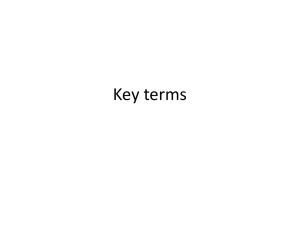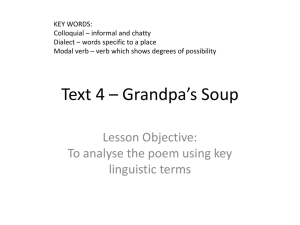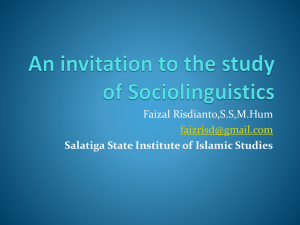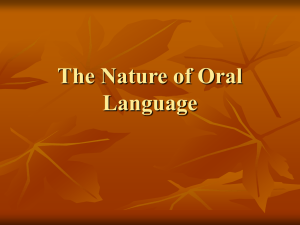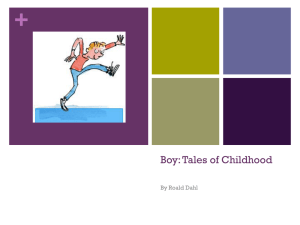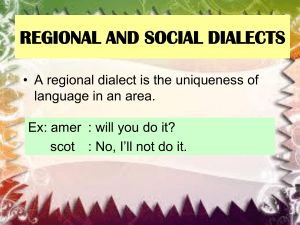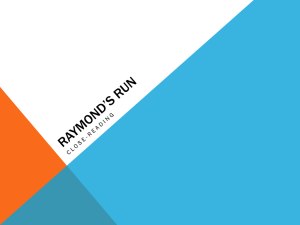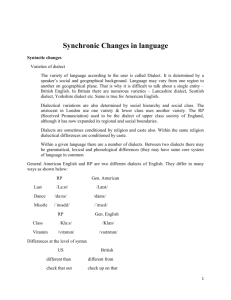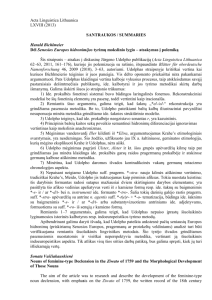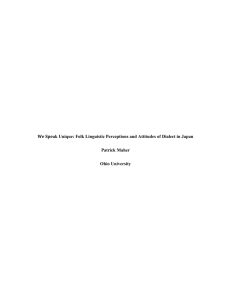第3组Language and culture
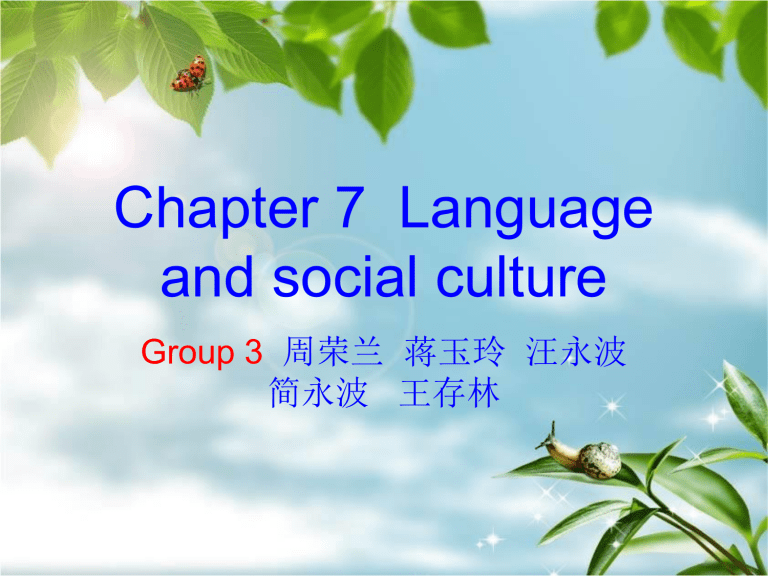
Chapter 7 Language and social culture
Group 3 周荣兰 蒋玉玲 汪永波
简永波 王存林
Language Varieties
( 语言多样性 )-----outline
•
•
•
•
•
•
•
• 1.Language and society
A.Language as a social activity
B.The definition of sociolinguistics
• C.Relation between language and society with the help of examples
• 2.Dialect varieties
A.Regional dialect
B.Temporal dialect
C.Sociolect/social dialect
D.Standard dialect
E.Idiolect
The understanding of
Language Varieties
• Variety is a generic term for aparticular coherent form of language in which specific extralinguistic criteria can be used to define it as a variety.
• Language showing variation in space, time and social distance.
examples
• A geographically defined variety is known as a dialect
• A functional variety as jargon
• A variety with a social basis as a sociolect
• A situative variety as a register
Language variety may include three terms
• Lingua franca( 通用语 )
• Pidgin( 洋泾滨英语 --混杂行话 )
• Creole( 克里奥尔语 )
Lingua franca( 通用语 )
• Lingua franca is the general term for a language that serves as a means of communication between different groups of speakers.
• Eg:English ,Putonghua
Pidgin( 洋泾滨英语 --混杂行话 )
• Pidgin refers to a contact language that arises in situations where speakers of different languages can not understand each other’s first language or native language and ,thus,need to develop a common means of communication.
• Eg :做了他 / 条子
Creole( 克里奥尔语 )
• Creoles are former pidgins whose functional and grammatical limitations and simplily simplification have been eliminated and which now function as full-fledged,standardized native languages .
• 克里奥尔语是混杂行话的前生,其功能和语法上
的局限性及简化性以被摒弃,如今它被作为一种
正式的,标准的本地语言而运用。
1.Language and society
Language is the most important tool of human communication, by which people preserve and transfer of human civilization achievements.No one would deny the relation of language to social culture of the language.The definition of language often includes a reference to social culture.Some linguists attempt to arrive at an understanding of the general principle governing both language and its use in sociocultural context.
• examples:
• London English/Oxford
English/Cambridge accent/New York
English/DC English/ 学生语言 / 娘娘腔 / 领
导者语言 / 农民语言 / 郊区语言 / 平话
Language as a social activity
• The close relationship between language and society can be evidenced in that though language is actualized through the mind and the mouth of the individual, we can see language is actualized through the mind and the mouth of the individual, we can see that one not only speaks but speaks to others, to inform or to persuade them.
Two manifestations( 两个表现 )
• Internal authority: self-adaptation in L1 acquisition = learn to model after the adults especially one’s parents in language behaviors such as a family or community.
• External authority: self-adaptation in L2 learning = learn to model after the instructors or native speakers in language behaviors in an institutional setting such as a formal class, or school.
The definition of sociolinguisitics
(社会语言学定义)
• Sociolinguisitics is the subdiscipline of linguistics that treats the social aspects of language, and it can therefore be defined as the study of language in relation to society.
(《语言概论》李
学珍 )
• there is a long tradition in the study of dialects and in the general study of the relation between language and the society at large,both of which are considered to belong under the general heading of sociolinguistics, the study of the language of real people in the real world .
Relation between language and society (语言和社会的关系)
• Language is a part of society and plays a very important role in it.
Example:
• language reflects the ideas, customs, and behavior of people in society.
Example:
Languages develop with the development of society.
Example: quanlity/complexity
Dialect
• A language is typically composed of a number of dialects.
• Dialect refers to any regional,social or ethnic variety of a language.
Dialect varieties
• (1)regional dialect (区域方言)
• (2)temporal dialect (暂时性方言 --现世方
言)
• (3)sociolect/social dialect (社会方言)
• (4)standard dialect (标准方言)
• (5)idiolect /personal language (个人习
语)
Regional Dialect
• Regional dialect is a linguistic variety used by people living in the same geographical region(e.g.Br.E.&Am.E.).
Example
• 我不想去玩
Temporal dialect
(
暂时性方言 --现世方言
)
Middle English, Medieval English, Old
English, Anglo-Saxon English, synchronic linguistics and diachronic linguistics
Social Dialect/Sociolect
• Social dialect is the linguistic variety characteristic of a particular social class.
• example
A When people phrasing approval or liking women:charming,cute,divine,lovely,sweet
Men:fine,good,great(if necessary ,they reinforce it with such an verb as damn,as in “ that was a damn good show ”)
B In Chinese, people from different social classes may use
夫人、太太、爱人、妻子、老婆、屋里的 to refer to “wife”.
Standard Dialect
• Social dialect is a special variety of a language, not related to any particular group of users.
• Because function as the public means of communication,it is subject to extensive condifiction (gramma,vocabulary,pronunciation and spelling),which is controlled,and passed on via the public media and institutions as news broadcasts, official documents and publications.but,above all,through the school systems .
• it is taught at school as a foreign or the second language
example
The BBC English, General American
English, Putonghua (Mandarin) or
Guo Yu, the national language.
Idiolect /personal language
个人习语
• a personal dialect of an individual speaker that combines elements regarding regional, social, g ender, and age variations
example: idiolect Zhu Ziqing’s prose and language, Lin Yutang’s language, Lao She’s language, Hemingway’s language
